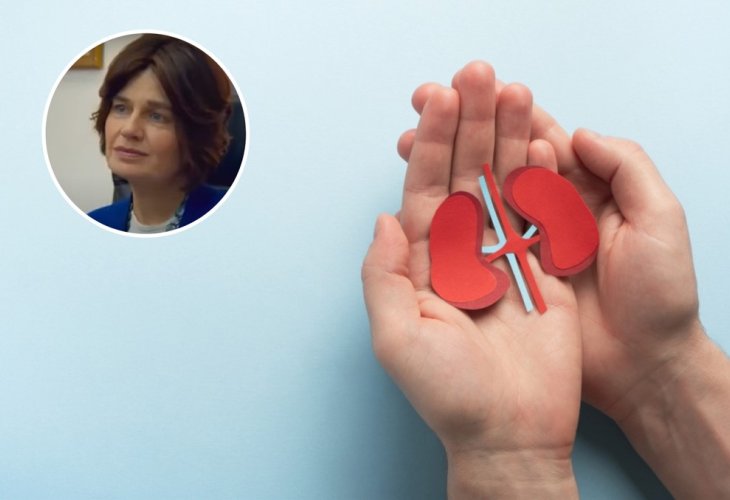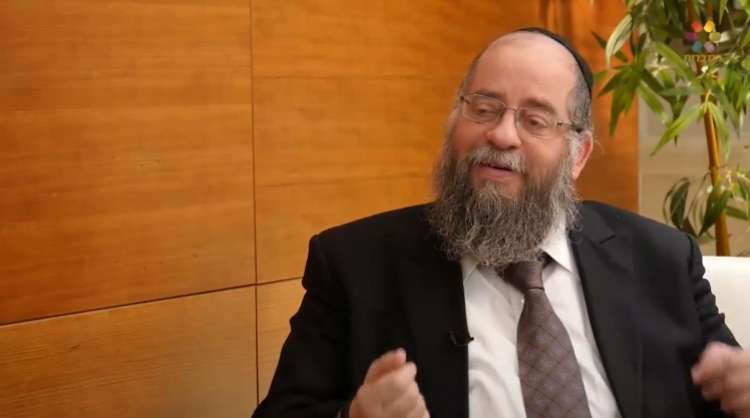Personal Stories
The Light of Giving: How Rabbanit Rachel Haber Unites Israel Through Kidney Donations
How the leader of “Matnat Chaim” continues her husband’s legacy and unites the nation through life-saving altruistic kidney donations
 (Background: shutterstock, Rebbetzin Rachel Haber: Screenshot, Channel 13)
(Background: shutterstock, Rebbetzin Rachel Haber: Screenshot, Channel 13)
Rabbanit Rachel Haber, who received the Israel Prize on Independence Day, made one thing clear from the very first phone call with the Minister of Education notifying her of the award: in her eyes, the real recipients are the kidney donors.
“The prize belongs to our kidney donors. They are the true heroes. I’m only the one who has the honor of representing them,” she explained. “They are the ones who entered the operating room, who parted with a piece of their own body, who gave it to a person they don’t even know — all wrapped in an enormous act of love.”
“My husband passed away — but Matnat Chaim will continue to live.”
For the past three years, Rabbanit Haber has served as Chairwoman of Matnat Chaim, following the passing of her husband, Rabbi Yeshayahu Haber. “Even before the funeral, I already knew I was continuing his mission,” she recalls. “I told my son, ‘Abba passed away, but Matnat Chaim will continue to live.’”
Over 600 transplants have taken place under her leadership so far — part of the more than 1,400 kidney transplants facilitated through the organization since its founding. The numbers are staggering, and they have placed Israel first in the world in altruistic, live kidney donations.
Rabbanit Haber’s contribution began long before she became chairwoman.
“We gave birth to Matnat Chaim together.”
“We gave birth to Matnat Chaim together,” she explains. “My husband was on the front lines, and I supported from behind.”
Rabbi Yeshayahu Haber, who had himself received a kidney transplant, left the hospital determined to express his gratitude in a practical way.
“He couldn’t suffice with gratitude — he wanted action. I told him it was unrealistic, that you can’t ask people to donate a kidney. He said he would never try to persuade anyone — only make information accessible.”
He gathered medical, halachic, legal, ethical, and social information and began to share it with others.
Where did the confidence come from? “Faith. From the belief that the path a person wants to take — God will lead him on. He believed deeply in our nation — a nation of compassion and kindness. He knew that others would want to save entire worlds: the lives of the patients waiting for a transplant and their families.”
Their first year saw four transplants, celebrated with enormous excitement. Fourteen years later, the organization passed 200 transplants in a single year.
“He works from above.”
Stepping into her husband’s shoes came naturally. “At almost every hospital visit, he would explain things to me and say, ‘So you’ll know, so you’ll know.’ Only after his passing did I realize what a teacher he was — what a great Rav preparing me for the mission.”
He had been everything — CEO, staff member, bookkeeper, secretary, even the janitor. After his passing, the work had to be divided among several people. Today the organization has additional staff, including a senior halachic authority.
 Rabbi Yeshayahu Haber, may his memory be a blessing
Rabbi Yeshayahu Haber, may his memory be a blessingRabbanit Haber Continues to Give
The Israel Prize committee noted that she “breathes life and hope into kidney patients and accompanies donors, recipients, and their families every step of the way until recovery.”
She visits every donor and recipient, speaks at almost every thanksgiving celebration, delivers motivational talks, and all the while continues working as a schoolteacher — a role she has held for 35 years.
“When my husband passed away at 55, one of his friends told me, ‘He didn’t die young — he lived fast.’ Every moment mattered to him.”
She draws her strength from each patient who returns to life — and from witnessing what she calls “a form of techiyat hametim”, a resurrection not only of the recipient but of the entire family previously chained to the burdens of dialysis.
“He helps me from heaven.”
Rabbanit Haber feels a profound, ongoing Divine assistance.
“One Rav told me: ‘Whatever a person does in this world with self-sacrifice, he continues from the next world with even greater strength.’ I feel my husband with me — helping, working from heaven to raise the number of kidney donations beyond anything imagined.”
She sees Matnat Chaim as a place of unity: “There is no right or left, religious or secular, Ashkenazi or Sephardi. No divisions, no rifts. It’s a pure place, where everyone is together.”
She witnessed this clearly on her husband’s third yahrzeit, when around 500 people — donors and recipients — came to his grave.
One moment deeply moved her: A widowed father, whose two sons received kidneys through the organization, approached her and hesitated. Then, with permission from his son, he said: “My son is a Tel Aviv lawyer. His kidney donor is a Breslov chassid from Modiin Illit. Since the transplant — for ten months now — my son eats only kosher food. No one told him to. He felt that the kidney, which had always received kosher food, should remain pure.”
She was deeply touched by this natural, mutual respect.
The Brightest Room in the Hospital
She sees this connection every day in hospitals. “Most donors are observant. Many recipients are not. Often I hear donors telling their recipients, ‘Until today, your kidney was deposited with me. Now it returns to you.’ They don’t give only a kidney — they give dignity, warmth, and love.”
Recipients, in turn, sometimes say with tears: “Forgive us. We didn’t know how much goodness and purity there is among you.” The emotional bonds formed are profound.
She shares a story: Last week she phoned a donor to ask for his name to pray for him before surgery. His wife answered and said he was out at the dry cleaners and the barber. At first Rabbanit Haber didn’t understand why.
His wife explained: “Before every holiday, he takes his suit to the cleaners and gets a haircut. On Sunday he’s entering the hospital for the transplant. It’s a holiday for him — so he’s preparing the same way.”
Another donor in Soroka Hospital was approached by a nurse at night who tried to navigate the room in the dark. When he offered to turn on the light, she replied: “In this room, we don’t need to turn on the light. This is the brightest room in the hospital.”
Giving with such joy and love brings to life the verse: “Love your fellow as yourself.”
Rabbanit Haber concludes: “This is all God wants from us — to love and honor each other. Even someone who cannot donate a kidney can always give a smile, a kind word, or a listening ear. Those, too, are gifts of life.”

